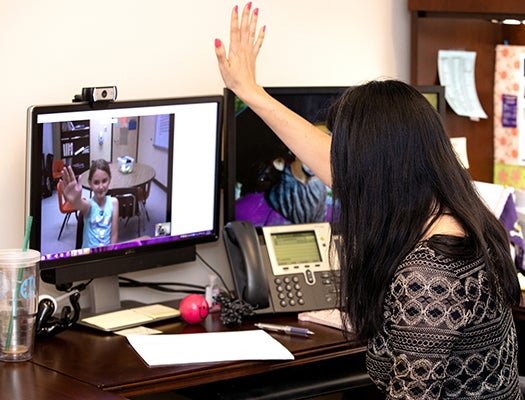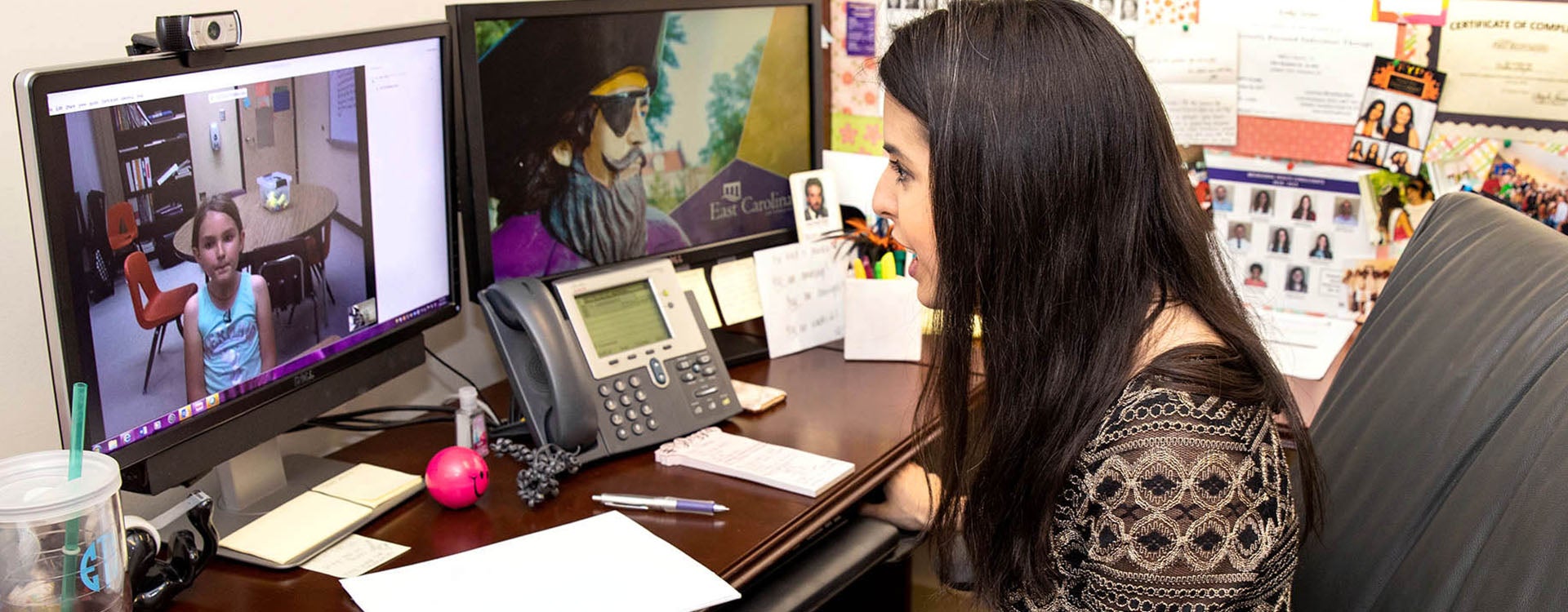SCHOOL-BASED TELEMEDICINE
Pioneering ECU telemedicine program brings health care to rural schools
East Carolina University, the Duplin County School District and health professionals in Duplin County collectively launched an initiative in 2016 in hopes of removing some of the barriers to health care that children in rural areas typically face. At that time, the goal was to connect students and staff in just three of Duplin County’s 14 schools with quality behavioral health, nutrition and acute medical care services through ECU’s Healthier Lives at School and Beyond School-Based Telemedicine Program – an initiative funded by a $1.2 million grant through the federal Health Resources and Services Administration (HRSA).
“Being that we’re from a rural area in the coastal plains of North Carolina, we have limited resources for (these) services. Most of our students have to travel for about an hour on either side of our county to receive behavioral health services,” said Sue Ellen Cottle, lead school nurse for Duplin County Schools. These barriers – as well as low income, lack of insurance and limited transportation – previously led to issues with student absenteeism, parents missing work and, even worse, the children not receiving the health care they need.
“I think everybody in education and health care recognizes that poorer families face barriers to care – there’s more morbidity, more mortality and poorer outcomes,” said Dr. Mary Gaylord, a pediatrician at Goshen Medical Center in Wallace. “But when you work with poor kids on a regular basis, you see how those barriers play out.”
Three years after the launch of the school-based telemedicine program, however, Duplin County Schools officials say it has been such an incredible asset to staff, students and families that it has been expanded to all of the district’s schools.
“The benefits to us are immeasurable,” said Dr. Ben Thigpen, the district’s assistant superintendent for federal programs, student support and athletics. “It has provided things for our students that we wouldn’t have had. And we know, as educators, for kids who get good health care and are healthy, there are going to be academic benefits down the road.”
Removing barriers
While ECU has been a leader in telemedicine for about 20 years, the Healthier Lives at School and Beyond program is the first school-based telemedicine program of its kind in the region, according to the program’s coordinator Jill Jennings, of ECU’s Department of Family Medicine.

ECU’s Erika Taylor shares a virtual high-five with Duplin County fourth grader Jayleigh Sheffield. (Photo by Rhett Butler)
“ECU is fulfilling its mission by extending care and reaching out to rural areas,” Jennings said. “And by means of telemedicine, we’re able to extend our reach even further and have contact with that many more people.”
As of the end of May, more than 200 students and staffers have completed nearly combined 400 visits through the program, which is a collaboration between ECU, Duplin County Schools, the Center for Rural Health Innovation, the Duplin County Health Department and Goshen Medical Center.
This school year, in the aftermath of Hurricane Florence, Duplin County Schools officials said they received nearly double the typical amount of behavioral health referrals for students.
“We were greatly impacted by Hurricane Florence, which already put our kids out of school and our parents out of work,” Cottle said. “So the telemedicine program has been a great asset for our students because they don’t have to travel, their parents don’t have to get off of work or take their kids out of school.”
And because these services are taking place in a school, officials said care has been better coordinated.
“Our social workers, nurses, teachers and administrators know, and are more aware of, what the health care issues are with a student and we can accommodate that academically,” Thigpen said.
Gaylord, a graduate of ECU’s Brody School of Medicine, said the program has helped physicians get their patients quick access to the services they need.
“You just overcome all those barriers in one fell swoop. And when I have a child who needs something, I know I can get the child to the services,” she said. “And in our case, ECU has an excellent behavioral therapist and an excellent nutritionist. So you know that they are going to have top-notch care right there in their school.
“Every person that I have sent to a nutritionist or behavioral health specialist [via telemedicine] has been a success story. Their lives have been touched and changed by it, and they have been made healthier by it,” she continued. “And having children who are physically healthy, mentally healthy and nutritionally healthy creates stronger communities.”
Making a difference
Johnnie Wilson said his 13-year-old son, Jovan, has always been academically gifted, but often had trouble making friends and was sometimes bullied for being “different.”

Jovan Wilson (Photo courtesy of Johnnie Wilson)
The retired U.S. Army veteran instinctually tried to help his son by insulating him amongst family members and encouraging him to “toughen up” to get through the difficulties.
“My main reservation, like many parents, was that I didn’t want him to be labeled,” he said. “He’s a great student, and I didn’t want him to be labeled as handicapped, mentally incompetent or anything of that nature.”
However, Jovan’s teachers at Wallace Elementary School and Gaylord, his pediatrician, noticed these issues and informed Wilson about the long-term benefits of having Jovan speak to a behavioral therapist. That’s when he agreed to let his son take part in an in-school telemedicine session with Erika Taylor, a behavioral health clinical faculty member in ECU’s Department of Family Medicine.
“According to my son, it was awesome,” Wilson said. “He doesn’t have anybody, so technology is his friend. And speaking to someone through a computer screen, for him, was like being on a spaceship. He really enjoyed it.”
For Wilson, the enjoyment has come from talking to Jovan about the techniques he’s learning.
“He’s speaking with Erika and she gives him suggestions and pointers, and he comes home and practices it,” he said. “I think it’s a great program, especially when the child comes back and talks to the parent. That’s what I like about it, because you can see the difference in the child.”
The Healthier Lives at School and Beyond program has helped fourth grader Jayleigh Sheffield learn ways to better manage worry and stress.
“I think it’s pretty cool because I’ve never really talked to anyone over a computer screen before,” Sheffield said. “Mostly, I like the fact that if I ever feel like I have nobody else to talk to, I can come here and talk to (Taylor)… I like that if I had a problem, like if I was sad or something, she would help me calm down.”
Positive outcomes like these are why Jennings said officials are currently trying to build the Healthier Lives at School and Beyond program into a sustainable model in Duplin County and possibly expand it to other rural areas.
“Seeing firsthand what this program has offered people and hearing firsthand from a parent, from a child, is intensely gratifying,” Jennings said. “It’s meaningful work.”
